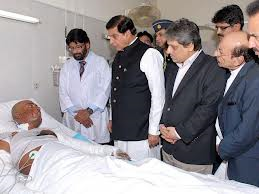
‘Bhuladia’ is not the name of a factory. It is a sickness of the ruling class. Somewhat different from Alzheimer’s disease, it is more selective in choosing what must be forgotten and what must be remembered. A ‘Bhuladia’ patient is predisposed to forgetting the insignificant and the ordinary while remembering the rich and the powerful. A society suffering from ‘Bhuladia’ syndrome will forget the burning alive of 300 ordinary factory workers but remember to drop the murder charges against the two rich and exploitative factory owners. The rentally compromised Raja and his capitalist minister aptly named as ‘Mandiwala’, could not have demonstrated more perfectly the signs and symptoms of the ‘Bhuladia’ disease.
People do not go to work to be burnt alive, blown into smithereens, or trapped in death chambers. In any civilized country there are at least three ways in which employers can be held liable for harm done to employees. They owe a vicarious liability if one employee injures another, a statutory liability imposed by the law of the land and a personal duty under the common law to take reasonable care to prevent harm or injury to employees at work. How come the Islamic Republic suddenly regresses by a thousand years when it comes to the life and wellbeing of its ordinary citizens. Even five months after the tragic event, the toll continues to be vaguely and insensitively referred to as ‘about 300’ dead.
Now that the compensatory crumbs have been distributed to the poor and the rich have been protected from the problematic sections of the penal code, there seems a sense of urgency to forget the past and get on with life. After all, profit-making must not be held back for too long. Do we not need to ask ourselves if we learnt any lessons from the tragic events of 11 September 2012, or do we continue to be just as vulnerable? Even in the 11th century, William the Conqueror had the good sense to legislate fire protection measures. These required all fires to be extinguished at night using a metal cover called ‘couvre feu’ that was put over the fire to exclude the air. The word was gradually adopted as ‘curfew’ – a time beyond which an activity must cease.
So what really went wrong in the ‘Bhuladia’ Factory? The lack of fire extinguishers, the locked evacuation doors, the absence of emergency procedures, the electric wires that sparked, the chemicals that were inflammable, the workers who were not enrolled with the concerned departments, the safety inspectors who never inspected, the hazards that were never identified, the safety training that was never conducted or the safety system that was not in place.
Perhaps it is too embarrassing to admit that while Pakistan has nuclear weapons, it does not have even a basic statutory and administrative health and safety system for its workforce. The existing requirements for safety are obsolete, inadequate and for most part non-existent. The existing safety enforcement mechanisms are corrupt, incompetent and dysfunctional. Like all other civilized countries, Pakistan too needs to create, through an Act of Parliament, an autonomous Occupational Safety and Health Authority (OSHA) for establishing and enforcing Occupational Health and Safety standards throughout the country.
A national Occupational Safety and Health Authority derives its legitimacy and support from three interdependent elements. An Occupational Health & Safety (OHS) Statutory Act, OHS Operational Regulations and the supporting Reference Codes and Standards.
Take for example the Canadian Labour Code or Act (R.S.C., 1985) which is the primary statutory document for Occupational Health and Safety. It lays down requirements for OHS that must be complied by employers, employees and government functionaries. It makes it obligatory for employers to pro-actively identify hazards and institute preventive measures to eliminate or reduce risks.
The operational details of the statutory requirements in terms of application, installation, operation, maintenance, inspections and records are described in Canada Occupational Health and Safety Regulations (SOR/86-304). The Regulations in turn refer to Standards and Codes (such as B51-97, Boiler, Pressure Vessel, and Pressure Piping Code) that provide specifications for the correct methods and materials used in products, buildings or processes.
A reactive and compensatory approach is counterproductive in the business of OHS. Pakistan seems to show no interest or inclination towards developing its OHS statutory, regulatory and administrative infra-structure. For the uneducated and the fake degree-holding parliamentarians, this and such other serious issues are indeed Greek and totally incomprehensible. Only an absolutely callous, clueless and indifferent state could sit back and do nothing to improve these life-threatening death traps referred to as workplaces. Civil society needs to stand up for the 56 million adult and 10 million child workers who work under perilous conditions to earn their daily bread.
Can the Election Commission add a new requirement for every parliamentarian to undergo compulsory service as an industrial worker for at least one week every year?

